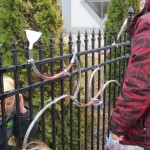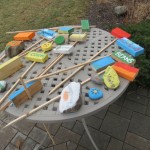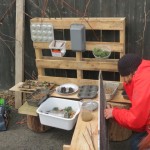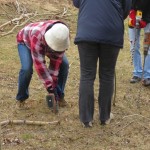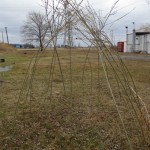Cultivating Natural Playgrounds Workshop Series Session Three: How Does Your Garden Grow; Water Walls; Dirt is Good; & The Stick…Yes You Can
How Does Your Garden Grow
Many educators feel they don’t have the green thumb it takes to grow a successful garden. This session demonstrated that simplicity is the key to any gardening adventure and inspired us to start small and grow from there. Participants learned all of the basics about planting, digging, weeding and stick fences, as well as how gardening provides opportunities for children’s learning to occur all year long.
Garden Signs using Scrap Wood
Garden Signs using Stones
Newspaper Pots Planting
Jug Planting
Plant Selections (suggested annuals, herbs, to attract butterflies, etc.)
Bird Seed Balls
‘Dirt is Good’
Making mud pies is a natural part of any childhood. It’s a simple activity that is packed full of learning concepts including: viscosity, density, volume and capacity. It’s also ideal for children who crave sensory experiences. Setting up a mud kitchen provides dramatic opportunities to enhance social and language skills. This session showed participants how to set up a mud kitchen in any playground and provide creative and meaningful experiences that are truly memorable.
Water Walls
All children love playing with water. Whether it’s jumping in a puddle or playing at the water table, it’s always a big hit. This workshop showed participants how to set up a water wall along any chain link fence, using some tubing, connectors and ties. We explored how to work with the children to control the amount and direction of the water and got tips and tricks for extending their learning. Create a unique outdoor activity centre with truly unlimited potential.
Materials List for Creating Water Walls for Under $20
The Stick – ‘Yes You Can’
Participants learned a variety of ways to encourage children to explore the natural world, starting with a stick. Learn where sticks come from, who needs them and their many uses. From painting sticks to stick art, to making stick people and animals, to building forts, sticks can be the focal point of many great learning opportunities. The best part is that sticks are free, which puts these opportunities within everybody’s reach.
What Participants Had to Say
“I love that I can take this learning back to my classroom immediately.”
“I will be able to implement what I’ve learned in my daily practices and inspire others (colleagues, parents, children).”
“Because the experiences were hands on with the easily accessible materials, I plan to try them at school.”

